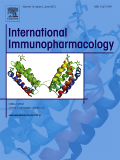
International Immunopharmacology
Scope & Guideline
Pioneering Insights in Immunopharmacological Research
Introduction
Aims and Scopes
- Immunomodulation:
The journal emphasizes research that explores how various agents, including drugs and biologics, can modulate the immune system, enhancing or suppressing immune responses for therapeutic purposes. - Inflammation and Disease:
A core area of focus is the role of inflammation in various diseases, including autoimmune disorders, cancer, and infectious diseases, and how pharmacological agents can alter inflammatory pathways. - Biomarkers and Therapeutics:
The identification and validation of biomarkers related to immune responses and the therapeutic efficacy of treatments are critical aspects of the journal's scope. - Translational Research:
The journal encourages studies that bridge basic immunological research with clinical applications, aiming to translate findings into effective treatments for patients. - Novel Therapeutic Approaches:
There is a strong emphasis on innovative therapeutic strategies, including the use of stem cells, nanoparticles, and biologics in immunotherapy and pharmacotherapy.
Trending and Emerging
- Immunotherapy Innovations:
There is a clear trend towards innovative immunotherapeutic strategies, including CAR-T cell therapies and checkpoint inhibitors, reflecting the rapid advancements in cancer treatment. - Microbiome and Immune Interactions:
Research exploring the gut microbiome's role in modulating immune responses and its implications for various diseases has gained significant traction. - Ferroptosis and Other Regulated Cell Death Pathways:
Studies focusing on ferroptosis and other forms of regulated cell death are emerging as critical areas of interest, particularly concerning their implications for cancer and autoimmune diseases. - Nanoparticle-Based Drug Delivery Systems:
The application of nanoparticles in drug delivery and immunomodulation is trending, highlighting their potential in enhancing therapeutic efficacy while minimizing side effects. - Personalized Medicine Approaches:
There is a growing emphasis on personalized medicine, with research increasingly focusing on tailoring immunotherapies based on individual patient biomarkers and genetic profiles.
Declining or Waning
- Traditional Pharmacological Approaches:
There seems to be a decreasing emphasis on classical pharmacological methods without immunological considerations, as newer, more integrated approaches are favored. - Basic Immunology without Clinical Application:
Research that does not connect basic immunological findings to clinical applications or therapeutic strategies appears to be less represented, reflecting a shift towards translational research. - Monotherapy Studies:
There is a notable decline in studies focusing solely on monotherapy outcomes, with a preference for combination therapies that address complex disease mechanisms. - In vitro Studies without In Vivo Validation:
Research that solely relies on in vitro models without subsequent in vivo validation is becoming less common, as the journal prioritizes studies that demonstrate practical therapeutic relevance.
Similar Journals

JOURNAL OF IMMUNOLOGY
Exploring Breakthroughs in Immune ScienceWelcome to the JOURNAL OF IMMUNOLOGY, a prestigious publication associated with the American Association of Immunologists and dedicated to advancing the field of immunology. With a rich history dating back to 1945, this journal is renowned for its high-impact research, evident in its notable 2023 Q1 rankings in both Immunology and Allergy, as well as its strong positions in Scopus rankings—Rank #68 in Immunology and Allergy and Rank #79 in Immunology and Microbiology. Although it operates on a subscription basis, its commitment to publishing cutting-edge studies ensures that it remains a vital resource for scientists, healthcare professionals, and students alike. As the journal continues to pave the way for innovative research and breakthroughs in immunological science, it facilitates a platform for dialogue and discovery among researchers and practitioners across the globe.

Immunotherapy Advances
Fostering collaboration and discovery in the world of immunology.Immunotherapy Advances, published by Oxford University Press, stands at the forefront of the rapidly evolving field of immunology and microbe interactions, focusing specifically on novel immunotherapeutic strategies and their clinical applications. Established in 2021, this peer-reviewed journal aims to disseminate high-quality research that contributes to the understanding and advancement of immunotherapeutic techniques, potentially transforming patient care in immunology. With a current Scopus rank of #140 out of 236 in the realm of Immunology, placing it in the 40th percentile, Immunotherapy Advances is positioned to be an integral resource for researchers, healthcare professionals, and students eager to stay updated with groundbreaking findings and methodologies. The journal is dedicated to fostering innovative discussions and collaborations, ensuring open access to vital research that influences treatment paradigms globally.

INFLAMMOPHARMACOLOGY
Exploring breakthroughs in inflammation research and therapeutics.INFLAMMOPHARMACOLOGY is a premier journal published by SPRINGER BASEL AG, specializing in the evolving fields of immunology and pharmacology. Established in 1991, the journal has made significant strides in contributing to the understanding of inflammation-related disorders, therapeutic innovations, and the pharmacological implications associated with these conditions. With an impressive Q2 ranking in Immunology and Q1 rankings in both Pharmacology and Medical Pharmacology for 2023, alongside notable Scopus rankings, INFLAMMOPHARMACOLOGY maintains its position at the forefront of scientific research. The journal provides a vital platform for researchers and practitioners to disseminate groundbreaking findings and explore novel approaches in therapeutics, reinforcing the importance of evidence-based medicine. Accessible exclusively through traditional subscription options, it continues to attract a diverse readership invested in advancing knowledge within these cutting-edge disciplines.
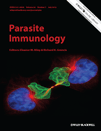
PARASITE IMMUNOLOGY
Exploring the Complexities of Immunological Defense.PARASITE IMMUNOLOGY, published by Wiley, is a leading journal in the field of immunology and parasitology, with an ISSN of 0141-9838 and E-ISSN of 1365-3024. Since its inception in 1979, it has played a pivotal role in advancing our understanding of host-parasite interactions, immunological responses to parasitic infections, and the mechanisms of immunological resistance. The journal is adeptly positioned within the academic community, currently holding a prestigious Q2 ranking in Parasitology and a Q3 ranking in Immunology for 2023, indicating its significant influence and relevance. Its comprehensive scope attracts a diverse readership, contributing to the discourse surrounding novel therapeutic approaches and emerging challenges in parasitic diseases. With a consistent convergence of research until 2024, PARASITE IMMUNOLOGY is an essential resource for researchers, professionals, and students seeking to deepen their knowledge and foster collaboration in these dynamic fields. Although it is not an open-access journal, the insights shared within its pages are invaluable for shaping future research trajectories.

IMMUNOPHARMACOLOGY AND IMMUNOTOXICOLOGY
Pioneering Research at the Intersection of Immunology and ToxicologyImmunopharmacology and Immunotoxicology, published by Taylor & Francis Ltd, is a distinguished academic journal with a focus on the interrelation between pharmacology, immunology, and toxicology. Established in 1978, the journal serves as a vital platform for the dissemination of cutting-edge research aimed at enhancing the understanding of immunologically mediated drug responses and toxic effects. The journal encompasses a broad scope of topics relevant to the fields of immunology, pharmacology, and toxicology, offering insights that are pivotal for both academia and the pharmaceutical industry. With a commendable 2023 impact factor and ranking in Q3 in Immunology and Q2 in both Pharmacology and Toxicology, it holds a respected position within its categories, making it a valuable resource for researchers, professionals, and students seeking to stay abreast of the latest developments in the field. The journal is accessible through traditional subscription models and encourages submissions that bring forth innovative findings that might influence therapeutic strategies and public health.

IMMUNOBIOLOGY
Fostering collaboration for impactful discoveries in immunobiology.IMMUNOBIOLOGY is a prestigious academic journal published by Elsevier GmbH that significantly contributes to the fields of hematology and immunology. With its ISSN 0171-2985 and E-ISSN 1878-3279, this journal has been disseminating impactful research since 1979, positioning itself at the forefront of immunological and hematological advances. The journal holds a commendable ranking of Q2 in Hematology and Q3 in both Immunology and Immunology and Allergy, indicating its relevance and influence within the scientific community, as reflected by its Scopus rankings. Although IMMUNOBIOLOGY operates under a subscription model, it remains dedicated to expanding knowledge across disciplines, fostering innovative research, and facilitating connections among researchers, professionals, and students. Situated in Munich, Germany, this journal is continually evolving and aims to remain an essential resource for the latest discoveries and insights in the realms of immunity and blood disorders, ultimately enhancing our understanding of complex biological systems.
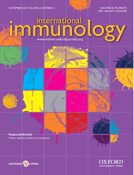
INTERNATIONAL IMMUNOLOGY
Advancing Immunological Insights for a Healthier Tomorrow.INTERNATIONAL IMMUNOLOGY, published by OXFORD UNIV PRESS, stands out as a premier journal in the field of immunology, providing a vital platform for disseminating groundbreaking research and innovative developments within the discipline. With an impressive Q1 ranking in Immunology and Allergy, as well as in Medicine (miscellaneous), it consistently showcases high-impact studies that contribute to the advancement of immunological knowledge. The journal spans over three decades, from its inception in 1989 to its ongoing contributions as of 2024, thus solidifying its reputation in the scientific community. Researchers, professionals, and students will find valuable articles that delve into the complexities of immune responses, therapeutic interventions, and emerging immunological paradigms, ensuring INTERNATIONAL IMMUNOLOGY remains at the forefront of knowledge in the life sciences.

Journal of Neuroimmune Pharmacology
Exploring the Intersection of Neuroscience and PharmacologyThe Journal of Neuroimmune Pharmacology, published by Springer, is a premier academic journal dedicated to advancing the field of pharmacology intersecting with neuroscience and immunology. With an outstanding impact factor and proudly positioned in the Q1 quartile across multiple categories, this journal showcases cutting-edge research that enhances our understanding of the neuroimmune system and its pharmacological implications. Established in 2006 and continuing through 2024, it serves as a vital resource for researchers, professionals, and students alike, offering insights into the mechanisms of drug action, disease processes, and therapeutic strategies. As a testament to its excellence, the journal ranks prominently in Scopus metrics within its discipline, making it an essential platform for disseminating high-quality research that drives innovation in immunology, allergy, neuroscience, and pharmacology.
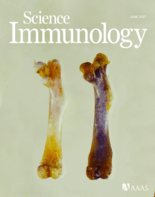
Science Immunology
Unlocking the Secrets of the Immune SystemScience Immunology, published by the American Association for the Advancement of Science, is a leading journal in the field of immunology, recognized for its significant impact and rigor in advancing our understanding of immune responses and complex diseases. With an impressive impact factor that places it in the Q1 category of both immunology and allergy, as well as miscellaneous medicine, this journal is ranked #7 and #8 in their respective Scopus categories, reflecting its high-quality research output. Since its inception in 2016, Science Immunology has been at the forefront of interdisciplinary immunological research, fostering crucial insights that link immunology with pressing health challenges. The journal is committed to providing open access to its content, ensuring that groundbreaking findings are accessible to a global audience of researchers, professionals, and students. Its anthology not only addresses fundamental immunological mechanisms but also enhances the dialogue on translational applications and therapeutic interventions, solidifying its position as an essential resource within the scientific community.
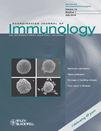
SCANDINAVIAN JOURNAL OF IMMUNOLOGY
Cultivating Knowledge in the Evolving Field of ImmunologyScandinavian Journal of Immunology is a prestigious peer-reviewed journal published by Wiley, focused on the evolving field of immunology and its interdisciplinary ties with medicine. Since its inception in 1972, this journal has cultivated a rich repository of knowledge, showcasing innovative research and reviews that contribute to the understanding of immune system functions, disorders, and therapeutic interventions. With an impressive impact factor reflecting a Q2 ranking in Immunology and a top-tier Q1 status in miscellaneous Medicine categories for 2023, it is recognized for its high-quality scholarly output, positioning it among the leading journals in the field. Additionally, its Scopus ranking of #84 out of 236 in Immunology underscores its significance and relevance to both emerging and established researchers. Although it does not currently offer open access options, the journal’s expansive reach and rigorous publication standards make it an essential platform for disseminating impactful research to the global scientific community. The journal invites submissions that explore the complexities of the immune system, aiming to bridge clinical and basic science for a comprehensive understanding of immunological phenomena.